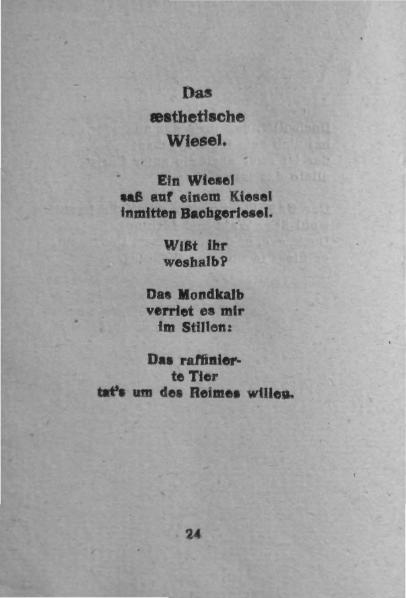The World of Loriot
 [Above: Loriot and Evelyn Hamann during a reading in the early 1980s in Dortmund. Photo by Ralf Zeigermann]
[Above: Loriot and Evelyn Hamann during a reading in the early 1980s in Dortmund. Photo by Ralf Zeigermann]
Loriot, or Vicco von Bülow (short for Bernhard-Viktor Christoph-Carl von Bülow; 1923-2011), is possibly Germany's most famous humorist - and certainly its most loved. After serving in the German army in the Second World War (a period in German history of which he was extremely ashamed), he studied art at the Academy of Arts in Hamburg. He began his career as a cartoonist in the 1950s with a series in Stern magazine, which he followed from the 1970s onwards with his animated series of cartoons featuring the characters 'Wum' and 'Wendelin' in support of the children's charity Aktion Sorgekind. The mid-1970s also saw him produce his most famous television series, Loriot, which also featured the comic actress Evelyn Hamann (1942-2007) with whom Loriot frequently worked in subsequent decades (e.g. the film Ödipussi in 1988). Many of the sketches in this series have entered German culture and are frequently remade and referenced by other comedians, for example, the 'Herren im Bad' sketch (Men in the Bath) or the pseudo-documentary 'Steinlaus' sketch.
Loriot's humour rested on the absurd effect created by the insistence on dignified conduct when faced with a disintegrating or grotesque situation or a failure of communication, his cartoon figures instantly identifiable through their distinctive, bulbous noses. You can visit the official Loriot website here.
Schnodderdeutsch & Schüttelreime
For German learners, the language can be full of unexpected humour in translation. German's large number of compound nouns can be the subject of humour in translation into English (is a Glühbirne a lightbulb or a glowing pear? Could there really be a variety of bird known as a Spaßvogel?), but there's plenty of fun to be had with double meanings in German vocabulary for native speakers and learners alike. Consider the sentence 'Dieser Bereich wird zur Verhütung von Straftaten durch die Polizei videoüberwacht', for example...! Or Schüttelreime, a form of wordplay in which the inital letters of a phrase can be exchanged to form a new phrase - and the two phrases still possess a common rhyme and rhythm (e.g. 'Schüttelreime machen Lust, möglich dass du lachen müsst!'). It has developed into a popular memory card game that also features regularly in the Süddeutsche Zeitung - Gemischtes Doppel!
 ['Das aesthetische Wiesel' by Christian Morgenstern, Galgenlieder (1923 edition)]
['Das aesthetische Wiesel' by Christian Morgenstern, Galgenlieder (1923 edition)]
Heinz Erhardt's poems frequently play on wordplay, for example, 'Warum die Zitronen sauer wurden', Joachim Ringelnatz's poetry, on the other hand, plays with rhyme, neologisms, (mis)use of grammatical rules and so on to produce ironic and often nonsense poems in everyday language. One of his most famous collections of poems is Die Schnupftabaksdose (1912). He is frequently compared with Christian Morgenstern, whose humorous Galgenlieder (1905) still enjoy immense popularity. You can watch the poet Nora Gomringer read Ringelnatz's work here.
But translating jokes and nuance of language is very difficult - and it became a problem for dubbing foreign language TV programmes and films into German. So Rainer Brandt developed a form of German for dubbing called Schnodderdeutsch, which dealt with untranslatable slang terms by making up new German phrases that were only understandable in a German context. This technique has been used on film and TV, notably Monty Python and the Holy Grail (in German: Die Ritter der Kokosnuss), though it is less common now.
Lieder lassen lachen...
Comic musical and lyrical acts abound in the modern German landscape: The style Die Ärzte, one of Germany's most successful punk pop bands and the name of whose frontman - Farin Urlaub - is itself a pun, is laden with irony, even when the lyrical content is serious. Farin Urlaub also has a solo career. The performances of the Wise Guys, an a cappella group, play with language, cultural references, musical rhythms and expression to produce an appealing comic body of work. There are also solo acts: Funny van Dannen's melancholically humorous songs on politics, society, and sexuality have been covered by bands such as Die Toten Hosen. Cabaret musician Bodo Wartke accompanies the entertaining rhymes and puns in his songs on the piano - these are frequently funny love songs, but he also engages in political and social commentary. Music itself is a source of comedy for some German acts, as Hans Liberg (who is Dutch, but also performs in German) and Hamburg's all-female quartet Salut Salon show to great effect.

